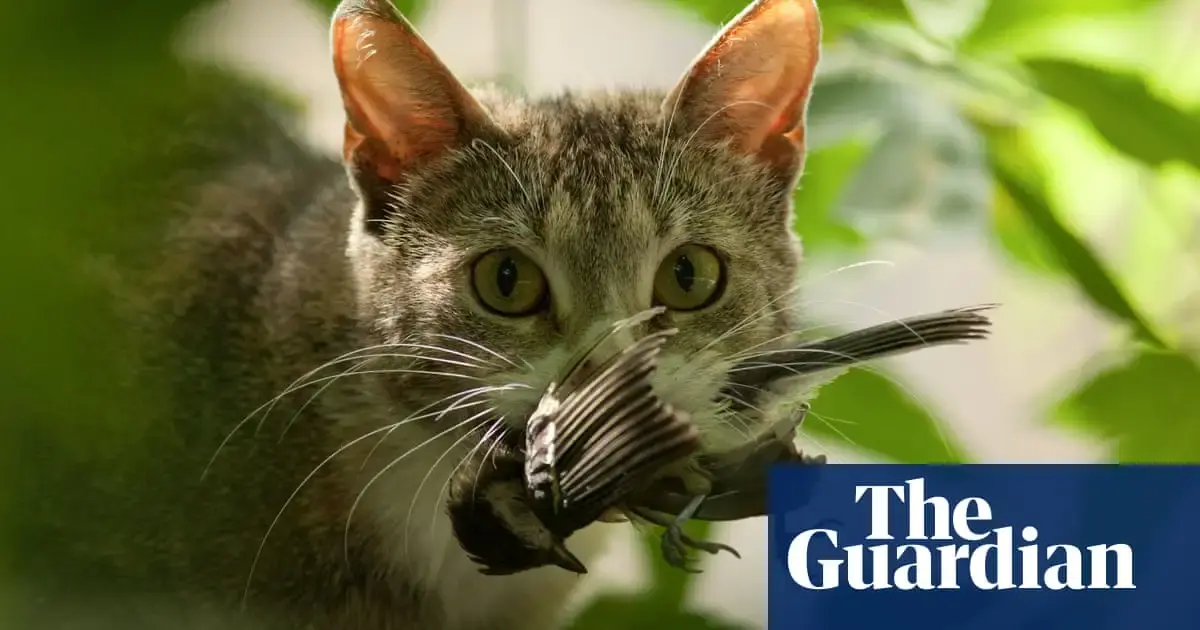[A study] show[s] [that domestic cats] eat more than 2,000 species globally – including hundreds that are of conservation concern.
“Our study sheds light on the predatory habits of one of the world’s most successful and widely distributed invasive predators,” the researchers, led by Christopher Lepczyk from Auburn University in the US, wrote in the paper.
Keep pets inside and everyone gets along :)
i’ll never understand why cat owners think it’s totally fine to let their cats run all around the neighborhood unchecked. my sister does this with her cat, claiming the cat is street smart about cars??? infuriating to say the least.
My brother is the same way. My cat lives inside (though we have a large balcony he runs around on as well, with planters he can lay in and monch on the cat-safe stuff I grow in them), and he is much safer for it.
Outdoor cats die to vehicles constantly, so it’s not just irresponsible towards local wildlife, it’s also irresponsible towards the cats.
There’s a lot of strong wording in the thread so please let me bring a little bit of perspective. I’m not trying to change anyone’s mind.
The fact that endangered species are being hunted by domestic cats is often a consequence of humans transforming natural habitats into suburbs. Animal welfare organizations have also spoken out in the past against sudden outdoor cat bans. Some papers have had a more nuanced outlook as well, raising questions about the welfare of cats confined indoors for their whole existence, unable to act out on their natural behaviour.
What I’m trying to say is that as with all controversial topics, it’s easy to get caught up but it’s useful to remain cool and curious. (Please don’t hurt me.)
I guess my only comment is that even if being kept inside all the time is bad for cats (which is really yet to be seen, cats live much longer lives on average indoors, but I guess it depends on what you mean by “good” for cats) you still can’t justify bringing an invasive species into an area where they’re not meant to be and justify it by saying “it’s bad for their health”. Then let cats be outside where they’re native. Let them be outdoors in Europe where they’re not as much of a threat and prey is more adapted to them. But letting them be outside in places like the US because it might be better for their health while it’s been proven to be bad for the health of hundreds of other species is silly, and I think anyone that is looking at it objectively can agree with that.
deleted by creator
From the article they mentioned that has a nuanced outlook: “While there are potential welfare impairments with indoor restrictions, a number of enrichment strategies have been suggested for counteracting these effects to promote the health, affective states, and performance of natural behaviors of indoor cats. Further research is needed to assess the efficacy of these strategies and to determine whether the welfare of cats is impaired by restriction. To develop effective educational strategies aimed at reducing the impact of uncontrolled outdoor access for cats, further research is necessary to improve our understanding of owner practices and attitudes towards outdoor access for cats.“
Pet owners that are responsible should be enacting enrichment strategies to keep them happy and healthy. Further research is needed to conclude strategies are effective, but I’m not sure the conclusion is no pet cats for all because “cruel”. My anecdotal evidence points to the strategies being effective, at least.
It is weird if you think about it that people buy intelligent animals as pets and then don’t bother to entertain them at all. It’s neglect. Cats are not difficult to care for but if your only entertainment for them is opening the door and hoping they find something out there to do without getting killed, then just don’t have them?
It really needs to be more socially acceptable to name and shame people that allow their cats to roam free outdoors. I’d also like to see some changes to pet ownership laws to prohibit/discourage it as well. A cat found outside a home (and not on a leash or in an enclosed cage) should immediately bring considerable financial repercussions down on the owner as well as removal of the cat from their “care”. If I get caught killing wild animals with my own hands (especially protected ones) then I am legally in deep shit, yet cat owners can get away with it with impunity. They’re basically letting a super predator roam free to slaughter wildlife while also putting it in incredible danger from other predators or cars.
People that let their cats roam outdoors are absolutely fucking atrocious pet owners and should be treated as such.
My mom has several cats and I tried to tell her this but she insists “this is just what cats do” and it is the natural order for cats to roam free outdoors. She thinks people who say cats belong indoors are out of touch with reality.
If someone tried to keep me in a house for the rest of my life I’d probably try to kill them. What would you do?
Yeah, but you’re not a cat. That is not the behavior of a well socialized, well taken care of cat.
I get that you don’t like the idea of pets, but equating indoor cats to a person being kidnapped is pretty disingenuous
How is it disingenuous? Some indoor cats are totally fine, but some are freaked out scared little things living in a terrible environment who desperately want to escape.
Some people treat the animals in their lives with dignity and a modicom of respect, others treat them like objects. My neighbor leaves his dogs in the cold all day. I’ve known people who kept cats in shitty little one room hoarder holes.
Just because you don’t see them as sentient or whatever doesn’t mean I don’t.
Seems like you should call animal control for a wellness check on your neighbor. People who abuse animals should not be allowed to keep animals as pets, totally agree on that. That isn’t indicative of every pet parent, though. I would say it isn’t even indicative of a large portion of them.
Also, I never said they weren’t sentient. I said they aren’t humans. Saying that keeping them inside and happy is the same as kidnapping a person is just off base.
Personally, I find the idea of owning a living thing a lot worse than letting one come and go as it pleases. It didn’t consent, and you have no right.
If you want animals to come and go as they please then don’t have pets. Leave the animals in the wild. Get yourself a bird table.
I don’t have pets. I think it’s kinda fucked up.
Idk, I only consider my cats to be housecats, if they stay indoors.
Once upon a time, a parakeet landed on the terrace… only to get promptly surrounded by 6 housecats. I managed to run out and shoo them away (not easy, had to actually push some with a broom), pick the parakeet and throw it out… but a few minutes later, it came back, and landed on the terrace again. This time the cats were faster, and got to it before I could.
Later I found out, that parakeets are an invasive species where I live, so… that turned out for the best? 😅
I appreciate the plot twist. 👍
As someone who adores parakeets (and has a few), just give them all to me. :)
https://mappingspain.com/the-exotic-green-parrots-of-spain/
It is estimated that there are 200,000 Monk Parakeets in Spain and they are considered an invasive species
Just come and get them… how many thousands would you like?
We also have some 5 million bunnies, with about a million or so getting culled every year. They aren’t an invasive species, but since agriculture has tended to create massive fields without a tree or as much as a post for birds of prey to sit on, the bunnies multiply and spread out of control, tunneling under roads, bullet train railroads, and invading city outskirts (they have no regard for fences).
deleted by creator
I mean, we’re probably the world’s most prolific and damaging invasive species, so why wouldn’t our pets be too?
TNR
https://abcbirds.org/program/cats-indoors/trap-neuter-release/
The gist of this: “The scientific evidence regarding TNR clearly indicates that TNR programs are not an effective tool to reduce feral cat populations. Rather than slowly disappearing, studies have shown that feral cat colonies persist and may actually increase in size.”
What are the alternatives?
Yup, thats why my adopted cat always, always stays indoor.
🤖 I’m a bot that provides automatic summaries for articles:
Click here to see the summary
Cats may be adored human companions, but they are also highly effective killers, according to a study that shows they eat more than 2,000 species globally – including hundreds that are of conservation concern.
“Our study sheds light on the predatory habits of one of the world’s most successful and widely distributed invasive predators,” the researchers, led by Christopher Lepczyk from Auburn University in the US, wrote in the paper.
Their impact on wildlife has spurred fierce debate in New Zealand, where one politician is campaigning to eradicate them completely, and controversy has erupted over competitions encouraging children to shoot feral cats.
In the south-western German town of Walldorf, people have been ordered to keep their cats locked inside for three months in spring to protect an endangered population of crested larks, which breed at that time.
So, it’s a good idea to limit new residential developments being built too close to important sites for ground-nesting birds, and reduce or remove feral cat populations on islands where they do not belong.”
Mike Toms from the British Trust for Ornithology (BTO), who was not involved in the study, said it provided “a welcome and much-needed global assessment of the impacts that free-ranging cats have on wildlife”.
Saved 70% of original text.
Once in the past cats were considered sent by the devil to help witches and were almost extinct, shortly after the Black Death eradicated more than half of the European population. Cats are harmful in countries like Australia, where the local fauna has no defenses against this predatory animal, in countries where predators like felines have never existed.










